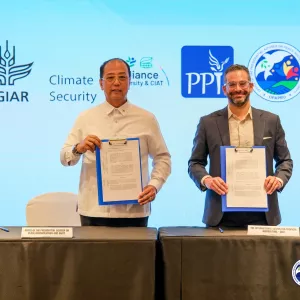CGIAR and OPAPRU Sign MOU to Study Climate Action and Peacebuilding in the Philippines
On November 5, 2025, at the fifth Peace Research Conference organized by the Office of the Presidential Adviser on Peace, Reconciliation, and Unity (OPAPRU) in Manila, a key milestone was reached toward integrating climate resilience into the Philippines’ peacebuilding agenda. CGIAR Climate Security, part of the Alliance of Bioversity International and CIAT, and OPAPRU formally signed a Memorandum of Understanding (MoU) to advance joint research and policy collaboration

CGIAR and OPAPRU Sign MOU to Study Climate Action and Peacebuilding in the Philippines
On November 5, 2025, at the fifth Peace Research Conference organized by the Office of the Presidential Adviser on Peace, Reconciliation, and Unity (OPAPRU) in Manila, a key milestone was reached toward integrating climate resilience into the Philippines’ peacebuilding agenda.
CGIAR Climate Security, part of the Alliance of Bioversity International and CIAT, and OPAPRU formally signed a Memorandum of Understanding (MoU) to advance joint research and policy collaboration on the intersection of climate, peace, and security across the Philippines. The agreement was signed by Secretary Carlito G. Galvez, Jr, Presidential Advisor on Peace, Reconciliation, and Unity (OPAPRU) and Adam Savelli, Regional Lead for Asia-Pacific (CGIAR Climate Security), marking the beginning of a formal collaboration between the institutions.

CGIAR Climate Security is a multidisciplinary research team within the CGIAR system that focuses on aligning climate, food-systems and environmental science with peace and security policy and practice. OPAPRU is the Philippine government office responsible for coordinating national peace policy, research and implementation, including peace education and the reintegration of former combatants.
The MoU establishes a plan to collaborate on understanding and addressing how climate risks shape peacebuilding dynamics in climate-vulnerable and conflict-affected areas of the Philippines, such as Mindanao. It will also help identify strategies through which climate adaptation, resilience building and disaster risk reduction can contribute to humanitarian relief, sustainable development, and positive peace.
“Let us not forget that climate change is not just an environmental issue. It is also a peace and security concern. With its expertise in environmental peacebuilding, this partnership with CGIAR Climate Security is both crucial and timely, as our nation is feeling the adverse impact of climate change on peace and human security.”
~ Secretary Carlito G. Galvez, Jr. (OPAPRU)
Guided by OPAPRU’s Research, Documentation and Evaluation (RDE) Agenda 2023–2028, the partnership aims to generate actionable evidence for policy and program development. Both institutions recognize that sustainable peace requires strengthening communities’ resilience to environmental risks while building inclusive and legitimate governance systems capable of managing natural resources equitably.
The cooperation focuses on “understanding the interactions and impacts of climate and peacebuilding in conflict-affected and vulnerable communities across the country.” This shared research agenda will help the Philippine government integrate climate adaptation strategies into its ongoing efforts to consolidate peace and social cohesion, while contributing to CGIAR’s global mission of leveraging science for a food-secure and resilient world.
“The relationship between climate and conflict is locally contextual; it is filtered through a place’s unique political, social, economic, and environmental variables. We at the Alliance are excited to work jointly with OPAPRU to generate knowledge that informs policies, programming, and investments to support conflict-affected, climate-vulnerable communities throughout the Philippines. It is an honour to be trusted with such a responsibility.”
~ Adam Savelli, CGIAR Climate Security
Areas of collaboration
The partners have identified three main areas of cooperation. First, they will pursue joint research initiatives aligned with OPAPRU’s Research, Documentation and Evaluation agenda, including studies on the socio-economic rehabilitation of conflict-affected communities, normalization processes for decommissioned combatants and peace-education competencies. Second, they will co-develop policy analyses, identify good practices, and convene consultations that bring together national and local stakeholders. Third, they will promote the sharing of expertise and capacity building among government actors, researchers and peace practitioners. .
The first research activity under the new MoU will assess peace education competencies among higher education institutions in conflict-affected regions. The goal is to integrate sustainability and environmental justice into peace education curricula, ensuring that future generations of peacebuilders are equipped to address both ecological and social dimensions of resilience. The resulting study will inform OPAPRU’s forthcoming Peace Education Competency Framework.
The first research output of the OPAPRU-CGIAR Climate Security collaboration— a policy brief on Climate, Peace, and Security in Mindanao— has just been published. The report presents a summary of research-to-date in climate-vulnerable and conflict-affected in three communities across Mindanao and sets the stage for additional research to come.
Author: Leonardo Medina and Adam Savelli, Alliance of Bioversity International and CIAT. Photo Credit: OPAPRU
This work is carried out with support from the CGIAR Climate Action Science Program (CASP) and the CGIAR Food Frontiers and Security (FFS) Science Program. We would like to thank all funders who supported this research through their contributions to the CGIAR Trust Fund: https://www.cgiar.org/funders/

